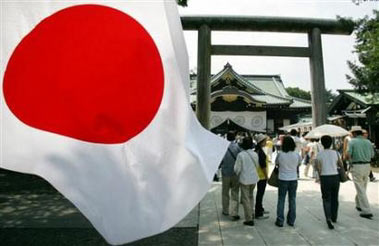Japanese Prime Minister Junichiro on Tuesday fuelled speculation he
would visit the Yasukuni Shrine next week on the anniversary of Japan's
surrender in World War II, saying a pledge to do so was still valid.

The
Yasukuni Shrine in Tokyo in a 2005 file photo.
[Reuters] |
Such a pilgrimage to the shrine in
Tokyo, where wartime leaders convicted as war criminals are honoured along with
Japan's 2.5 million war dead, is likely to hurt ties with China and South Korea,
where bitter memories of its aggression persist.
Koizumi promised during his successful campaign to become ruling party chief
in 2001 that he would visit Yasukuni, seen by Beijing and Seoul as a symbol of
Japan's past militarism, on August 15. He has visited the shrine every year
since then, but never on the surrender anniversary.
Asked by reporters on Tuesday if that promise was still valid, Koizumi said:
"Yes, it is indeed valid."
When pressed if this meant he would go on August 15, though, he merely
reiterated that he would make an "appropriate" decision.
Koizumi's annual visits to the shrine have markedly chilled ties with China
and South Korea, both of which have refused to hold a leaders' summit as a
result.
South Korean Foreign Minister Ban Ki-moon made an oblique reference to the
issue during a meeting with Japanese Foreign Minister Taro Aso, a Japanese
Foreign Ministry official said.
"The situation between Japan and South Korea, in which leaders' summits
cannot be held, is not normal. It's important to normalise things as soon as
possible," Ban was quoted as saying.
He also said that impediments to summits had to be removed, but made no
direct mention of Yasukuni, the official said.
China on Monday urged Japan to stop visits by its leaders to Yasukuni.
"We want top Japanese officials to call an immediate halt to visits to
Yasukuni, where Class A war criminals are enshrined," Chinese foreign ministry
spokesman Liu Jianchao told reporters during a visit to Tokyo.
Last week, media reports said chief cabinet secretary Shinzo Abe, the
front-runner to become Japan's next prime minister when Koizumi steps down in
September, had secretly paid his respects at the shrine in April.
Abe, who has supported Koizumi's visits, has repeatedly declined to confirm
or deny whether he had visited the shrine.
SECULAR MEMORIAL
Earlier on Tuesday, Foreign Minister Aso -- a dark horse candidate to succeed
Koizumi -- proposed making the shrine a secular, state-run memorial that the
emperor could visit.
Aso, known as a diplomatic hawk who has offended China and South Korea in the
past, said his plan was not aimed at mollifying foreign countries.
Instead, he hopes to resolve a domestic debate that flares up whenever a
Japanese leader visits the shrine and has prevented the emperor from going there
since 14 "Class A" war criminals were added to the lists of those honoured at
the shrine in 1978.
"It's about expressing our respect and gratitude for those who died for their
country and praying for the peace of the souls of those who died...without all
this fuss," Aso said.
Other politicians have suggested creating a new secular war memorial,
enhancing an existing memorial for unknown soldiers, or removing the war
criminals from the lists of those honoured at Yasukuni as ways to resolve the
diplomatic dilemma.
Shrine authorities have opposed all those ideas.
Yasukuni, founded in 1869 and funded by the state until 1945, was central to
the wartime state Shintoism which mobilised the Japanese people to fight in the
name of a divine emperor.